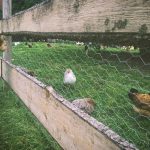Keeping guinea fowl with chickens is a common practice among poultry keepers. Guinea fowl possess distinct traits and behaviors that can complement a chicken flock. When integrated successfully, guinea fowl can offer various advantages to the overall poultry management system.
However, introducing guinea fowl to an established chicken flock requires careful planning and consideration to ensure a harmonious coexistence. This article will examine several key aspects of keeping guinea fowl with chickens:
1. The behavior and characteristics of guinea fowl
2.
Benefits of incorporating guinea fowl into a chicken flock
3. Important considerations for introducing guinea fowl to chickens
4. Housing and feeding requirements for mixed flocks
5.
Potential challenges and their solutions
6. Practical tips for successful co-habitation
By addressing these topics, poultry keepers can make informed decisions about integrating guinea fowl into their existing chicken flocks and maximize the benefits of this mixed-species approach to poultry keeping.
Table of Contents
- 1 Guinea Fowl Behavior and Characteristics
- 2 Benefits of Keeping Guinea with Chickens
- 3 Considerations for Introducing Guinea to a Chicken Flock
- 4 Housing and Feeding Requirements for Guinea and Chickens
- 5 Potential Challenges and Solutions
- 6 Conclusion and Tips for Successful Co-habitation
- 7 FAQs
- 7.1 Can guinea fowl be kept with chickens?
- 7.2 What are the benefits of keeping guinea fowl with chickens?
- 7.3 Are there any drawbacks to keeping guinea fowl with chickens?
- 7.4 What should be considered when introducing guinea fowl to a chicken flock?
- 7.5 Do guinea fowl and chickens require the same housing?
Key Takeaways
- Keeping guinea fowl with chickens can be beneficial for pest control and flock protection.
- Guinea fowl are known for their loud calls, strong flock instincts, and ability to forage for insects.
- Benefits of keeping guinea with chickens include reduced tick and insect populations, increased flock alertness, and improved overall flock health.
- When introducing guinea fowl to a chicken flock, it’s important to consider the age and size of the birds, as well as providing adequate space and resources.
- Housing and feeding requirements for guinea and chickens should take into account the different needs and behaviors of each species, such as roosting preferences and dietary differences.
Guinea Fowl Behavior and Characteristics
They are hardy birds that can thrive in a range of climates and are relatively low maintenance compared to other poultry species. Guinea fowl are also known for their loud calls, which can be a deterrent to predators. They are generally peaceful birds but can be aggressive towards other poultry if they feel threatened or if their territory is invaded.
Behavior and Characteristics
Understanding the behavior and characteristics of guinea fowl is essential when considering keeping them with chickens. Guinea fowl are also known for their unique appearance, with their distinctive feather patterns and helmet-like casque on top of their heads. They come in a variety of colors, including pearl, lavender, and royal purple.
A Delightful Addition to Any Flock
Their striking appearance adds visual interest to a mixed poultry flock and can be a delightful addition to any backyard or farm setting. Overall, guinea fowl are fascinating birds with a range of behaviors and characteristics that make them an intriguing addition to a mixed poultry flock.
Benefits of Keeping Guinea with Chickens

There are several benefits to keeping guinea fowl with chickens. One of the main advantages is their ability to control insect populations. Guinea fowl are voracious insect eaters and can help reduce the presence of pests such as ticks, flies, and mosquitoes in the area where they are kept.
This can be particularly beneficial for chicken flocks, as it can help reduce the risk of disease transmission from insects. Additionally, guinea fowl are excellent at alerting the flock to potential threats, making them effective watch birds. Their loud calls can serve as a warning system for the entire flock, helping to keep chickens safe from predators.
Another benefit of keeping guinea fowl with chickens is their ability to add diversity to the flock. Their unique appearance and behavior can provide visual interest and entertainment for poultry enthusiasts. Guinea fowl also have a different foraging pattern than chickens, which can help reduce competition for food resources.
This can be particularly beneficial in free-range settings where multiple poultry species are kept together. Overall, keeping guinea fowl with chickens can provide a range of benefits for both the birds and their caretakers.
Considerations for Introducing Guinea to a Chicken Flock
Introducing guinea fowl to a chicken flock requires careful consideration and planning to ensure a successful co-habitation. Guinea fowl have strong flocking instincts and may be territorial, so it is important to introduce them to the chicken flock gradually. It is recommended to introduce guinea fowl when they are young so that they can integrate more easily into the existing flock.
Additionally, providing ample space for both guinea fowl and chickens to establish their territories can help reduce potential conflicts. It is also important to consider the sex ratio when introducing guinea fowl to a chicken flock. Keeping a balanced ratio of males to females can help reduce aggression and competition within the flock.
Additionally, providing multiple feeding and watering stations can help prevent resource guarding and reduce potential conflicts between guinea fowl and chickens. Overall, careful consideration of the social dynamics and territorial behaviors of both guinea fowl and chickens is essential when introducing them to a mixed poultry flock.
Housing and Feeding Requirements for Guinea and Chickens
When keeping guinea fowl with chickens, it is important to provide suitable housing and feeding arrangements for both species. Guinea fowl require roosting space at night to protect them from predators, as well as shelter from the elements. Providing separate roosting areas for guinea fowl and chickens can help reduce potential conflicts over roosting space.
Additionally, ensuring that both species have access to suitable nesting areas can help prevent competition for nesting sites. In terms of feeding requirements, guinea fowl have different dietary preferences than chickens and may require supplemental feeding to meet their nutritional needs. Providing separate feeding stations for guinea fowl and chickens can help ensure that each species has access to appropriate food resources without competition.
Additionally, offering a balanced diet that meets the nutritional needs of both guinea fowl and chickens is essential for maintaining their health and well-being. Overall, providing suitable housing and feeding arrangements for both guinea fowl and chickens is essential for successful co-habitation.
Potential Challenges and Solutions

Aggression and Competition
When keeping guinea fowl with chickens, one common challenge is aggression between the two species, particularly during the introduction phase. However, providing ample space and multiple resources can help reduce competition and aggression within the flock.
Predation and Security
Another potential challenge is predation, as guinea fowl are known for their loud calls that can attract predators. Ensuring that the housing and fencing for the mixed flock are secure can help protect both guinea fowl and chickens from potential threats.
Shelter and Roosting Areas
Providing suitable shelter and roosting areas for guinea fowl at night can help protect them from nocturnal predators. This is an essential aspect of keeping guinea fowl with chickens, as it can help prevent losses and ensure the well-being of both species.
Successful Co-Habitation
Overall, being aware of potential challenges and implementing proactive solutions can help ensure successful co-habitation between guinea fowl and chickens. By taking the necessary precautions and providing a suitable environment, you can enjoy the benefits of keeping these two species together.
Conclusion and Tips for Successful Co-habitation
In conclusion, keeping guinea fowl with chickens can provide a range of benefits, including insect control, predator alertness, visual interest, and reduced competition for food resources. However, introducing guinea fowl to a chicken flock requires careful consideration of their behavior and characteristics, as well as planning to address potential challenges such as aggression and predation. To ensure successful co-habitation between guinea fowl and chickens, it is important to provide suitable housing and feeding arrangements that meet the needs of both species.
Additionally, monitoring the social dynamics of the mixed flock and intervening if necessary can help prevent conflicts from escalating. Overall, with careful consideration and proactive management, keeping guinea fowl with chickens can be a rewarding experience that provides a range of benefits for both the birds and their caretakers.
If you are considering keeping a guinea with chickens, you may also be interested in learning about creating a chicken coop that doubles as a country diner. This article from Poultry Wizard provides tips and ideas for turning your chicken coop into a place where your feathered friends can dine and socialize. Check it out here.
FAQs
Can guinea fowl be kept with chickens?
Yes, guinea fowl can be kept with chickens. They are often kept together to help control pests and provide additional security for the flock.
What are the benefits of keeping guinea fowl with chickens?
Guinea fowl are excellent at controlling pests such as ticks, flies, and other insects. They also provide additional security for the flock by being alert and vocal in the presence of predators.
Are there any drawbacks to keeping guinea fowl with chickens?
Guinea fowl can be noisy and may disturb neighbors, so it’s important to consider the noise level before keeping them with chickens. They can also be aggressive towards other birds, so it’s important to monitor their behavior.
What should be considered when introducing guinea fowl to a chicken flock?
When introducing guinea fowl to a chicken flock, it’s important to do so gradually and monitor their interactions. It’s also important to provide separate feeding and watering areas to prevent competition between the guinea fowl and chickens.
Do guinea fowl and chickens require the same housing?
Guinea fowl and chickens can share the same housing, but it’s important to provide enough space for both species. Guinea fowl prefer to roost in trees, so providing a suitable roosting area is important. Additionally, guinea fowl may need a separate nesting area as they can be aggressive towards chickens when nesting.
Meet Walter, the feathered-friend fanatic of Florida! Nestled in the sunshine state, Walter struts through life with his feathered companions, clucking his way to happiness. With a coop that’s fancier than a five-star hotel, he’s the Don Juan of the chicken world. When he’s not teaching his hens to do the cha-cha, you’ll find him in a heated debate with his prized rooster, Sir Clucks-a-Lot. Walter’s poultry passion is no yolk; he’s the sunny-side-up guy you never knew you needed in your flock of friends!







